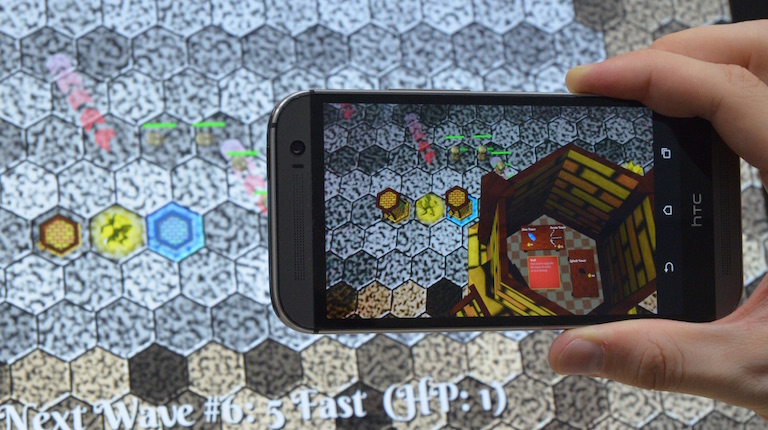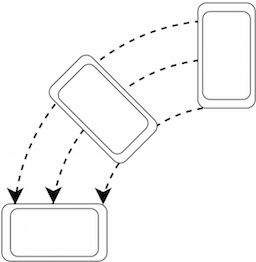Towering Defense: An Augmented Reality Multi-Device Game
Abstract
This bachelor's thesis aims to present a modern approach for interaction between multiple devices using the example of a simple game like tower defense. The player is able to play the game on the tablet by using simple touch input and the mobile device for further interaction.
The position of the phone relative to the tablet is tracked by using feature tracking of the image on the tablet which is updated in realtime. Depending on the position of the smartphone the player can select different towers or different floors of a tower for additional interaction inside the towers. Additionally selecting a resource node allows a player to mine it by executing the mining gesture with his mobile device. After selecting an enemy the user is able to perform gesture based interaction to deal damage directly to the selected unit.
Overview
For this bachelor's thesis two applications were developed and evaluated. Unity3D was used for both applications.
Tablet application
This application runs on a touch device and is the core application of the game. This includes the most game mechanics and interaction.
Smartphone application
This application is used for showing 3d representations of the towers and monsters through augmented reality and for interaction with them.
Implementation
Both applications where implemented from scratch using Vuforia and consist the following features:
- Path finding and movement of the enemies
- Building and upgrading of the towers
- Spawning of enemies
- Dealing damage and destroying of enemies
- Resources management
- Animations and effects
- Interaction on the tablet and the smartphone
There are two different types of interaction.
Interaction based on Augmented Reality
For upgrading the walls and towers first the user has to select a tower by taping it on the smartphone. After the selection a bigger version of the tower appears. This version is called ghost tower. To enter the tower the user has to move the smartphone towards the ghost tower. After entering he can select upgrades and upgrade the tower.

Gesture-based Interaction
For the gesture-based interaction the user has to select an object (either a resource node or an enemy) to interact with it. The selection is show to the user either by an information about the resource node or by a rotating circle around the enemy. Now the user can perform a gesture. For the bachelor's thesis a gesture similar to mining using a pickaxe can be used for mining the resource node or doing damage to the enemy.

Evaluation
To evaluate the multi-device interaction a user study was performed. The user study consisted of two parts:
- During the Training Period the user was shown all the interactions he can perform and given some time to play around and ask questions.
- During the Play Period the user has to play the game for 40 waves.
After the user study the user were asked to fill out a questionnaire. During the interview afterwards the probands were asked about their impression and opinion about the interaction.
Feedback
Since the interaction for upgrading was strictly bound to the smartphone application, all probands had issues even after the training period. The tracking used for the augmented reality caused as well some issues because of the lighting of the room and the reflection of the tablet. For that reason sometimes users could not select or upgrade towers. All the probands liked the gesture-based interaction for it's simplicity.
Video
Resources
- Game engine and platform: Unity3D
- Augmented Reality Framework for Unity3D: Vuforia

